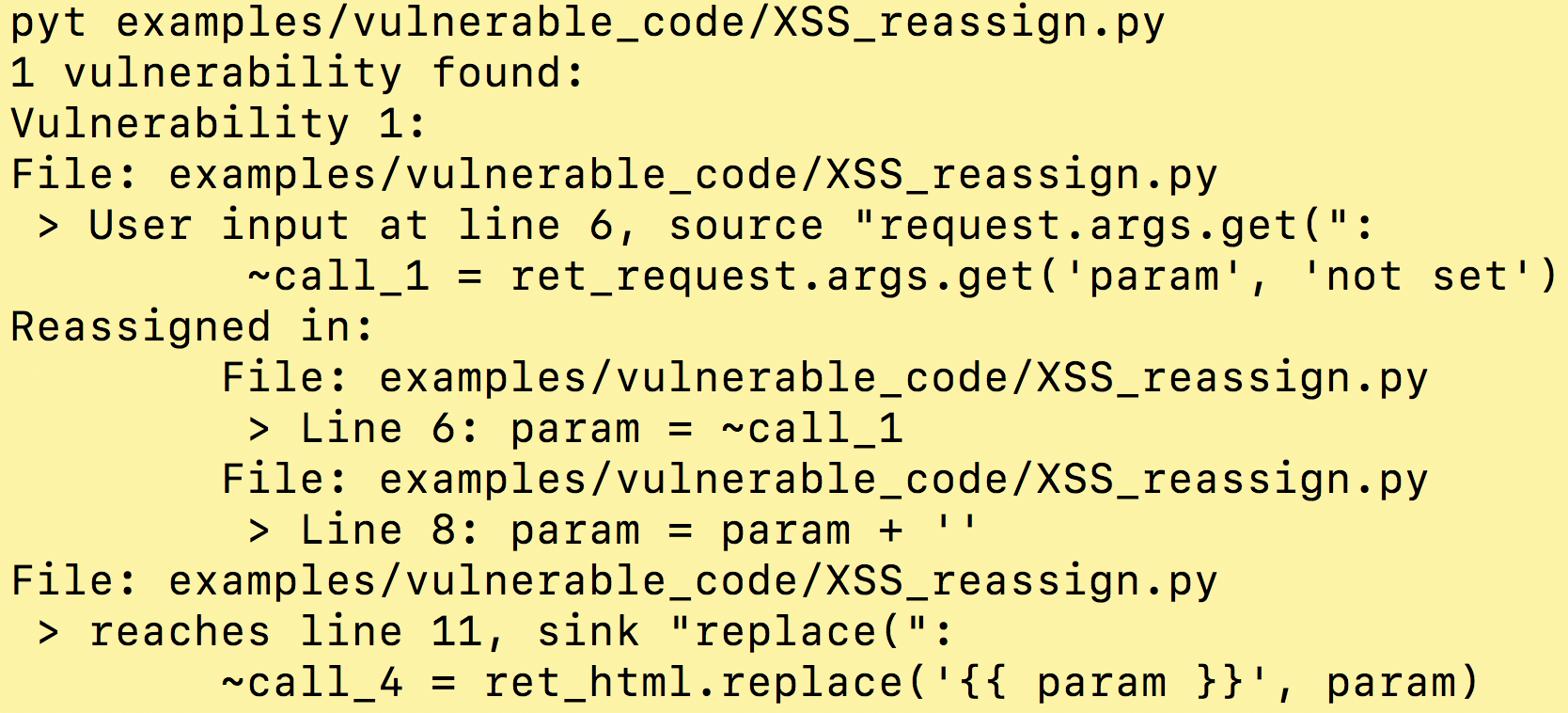


This project is no longer maintained
March 2020 Update: Please go see the amazing Pysa tutorial that should get you up to speed finding security vulnerabilities in your Python codebase.
Pyre from Facebook is an amazing project that has a bright future and many smart people working on it. I would suggest, if you don't know that much about program analysis, that you understand how PyT works before diving into Pyre. Along with the README's in most directories, there are the original Master's Thesis and some slides. With that said, I am happy to review pull requests and give you write permissions if you make more than a few.
There were a lot of great contributors to this project, I plan on working on other projects like detect-secrets and others (e.g. Pyre eventually) in the future if you'd like to work together more :)
If you are a security engineer with e.g. a Python codebase without type annotations, that Pyre won't handle, I would suggest you replace your sinks with a secure wrapper (something like defusedxml), and alert off any uses of the standard sink. You can use Bandit to do this since dataflow analysis is not required, but you will have to trim it a lot, due to the high false-positive rate.
Python Taint
Static analysis of Python web applications based on theoretical foundations (Control flow graphs, fixed point, dataflow analysis)
Features
- Detect command injection, SSRF, SQL injection, XSS, directory traveral etc.
- A lot of customisation possible
For a look at recent changes, please see the changelog.
Example usage and output:
Install
Before continuing, make sure you have python3.6 or 3.7 installed.
pip install python-taint
✨🍰✨
PyT can also be installed from source. To do so, clone the repo, and then run:
python3 setup.py install
How it Works
Soon you will find a README.rst in every directory in the pyt/ folder, start here.
How to Use
- Choose a web framework
The -a option determines which functions will have their arguments tainted, by default it is Flask.
- (optional) Customize source and sink information
Use the -t option to specify sources and sinks, by default this file is used.
- (optional) Customize which library functions propagate taint
For functions from builtins or libraries, e.g. url_for or os.path.join, use the -m option to specify whether or not they return tainted values given tainted inputs, by default this file is used.
Usage
usage: python -m pyt [-h] [-a ADAPTOR] [-pr PROJECT_ROOT]
[-b BASELINE_JSON_FILE] [-j] [-t TRIGGER_WORD_FILE]
[-m BLACKBOX_MAPPING_FILE] [-i] [-o OUTPUT_FILE]
[--ignore-nosec] [-r] [-x EXCLUDED_PATHS]
[--dont-prepend-root] [--no-local-imports]
targets [targets ...]
required arguments:
targets source file(s) or directory(s) to be scanned
important optional arguments:
-a ADAPTOR, --adaptor ADAPTOR
Choose a web framework adaptor: Flask(Default),
Django, Every or Pylons
-t TRIGGER_WORD_FILE, --trigger-word-file TRIGGER_WORD_FILE
Input file with a list of sources and sinks
-m BLACKBOX_MAPPING_FILE, --blackbox-mapping-file BLACKBOX_MAPPING_FILE
Input blackbox mapping file
optional arguments:
-pr PROJECT_ROOT, --project-root PROJECT_ROOT
Add project root, only important when the entry file
is not at the root of the project.
-b BASELINE_JSON_FILE, --baseline BASELINE_JSON_FILE
Path of a baseline report to compare against (only
JSON-formatted files are accepted)
-j, --json Prints JSON instead of report.
-i, --interactive Will ask you about each blackbox function call in
vulnerability chains.
-o OUTPUT_FILE, --output OUTPUT_FILE
Write report to filename
--ignore-nosec Do not skip lines with # nosec comments
-r, --recursive Find and process files in subdirectories
-x EXCLUDED_PATHS, --exclude EXCLUDED_PATHS
Separate files with commas
--dont-prepend-root In project root e.g. /app, imports are not prepended
with app.*
--no-local-imports If set, absolute imports must be relative to the
project root. If not set, modules in the same
directory can be imported just by their names.
Usage from Source
Using it like a user python3 -m pyt examples/vulnerable_code/XSS_call.py
Running the tests python3 -m tests
Running an individual test file python3 -m unittest tests.import_test
Running an individual test python3 -m unittest tests.import_test.ImportTest.test_import
Contributions
Join our slack group: https://pyt-dev.slack.com/ - ask for invite: [email protected]
Virtual env setup guide
Create a directory to hold the virtual env and project
mkdir ~/a_folder
cd ~/a_folder
Clone the project into the directory
git clone https://github.com/python-security/pyt.git
Create the virtual environment
python3 -m venv ~/a_folder/
Check that you have the right versions
python3 --version sample output Python 3.6.0
pip --version sample output pip 9.0.1 from /Users/kevinhock/a_folder/lib/python3.6/site-packages (python 3.6)
Change to project directory
cd pyt
In the future, just type source ~/a_folder/bin/activate to start developing.

